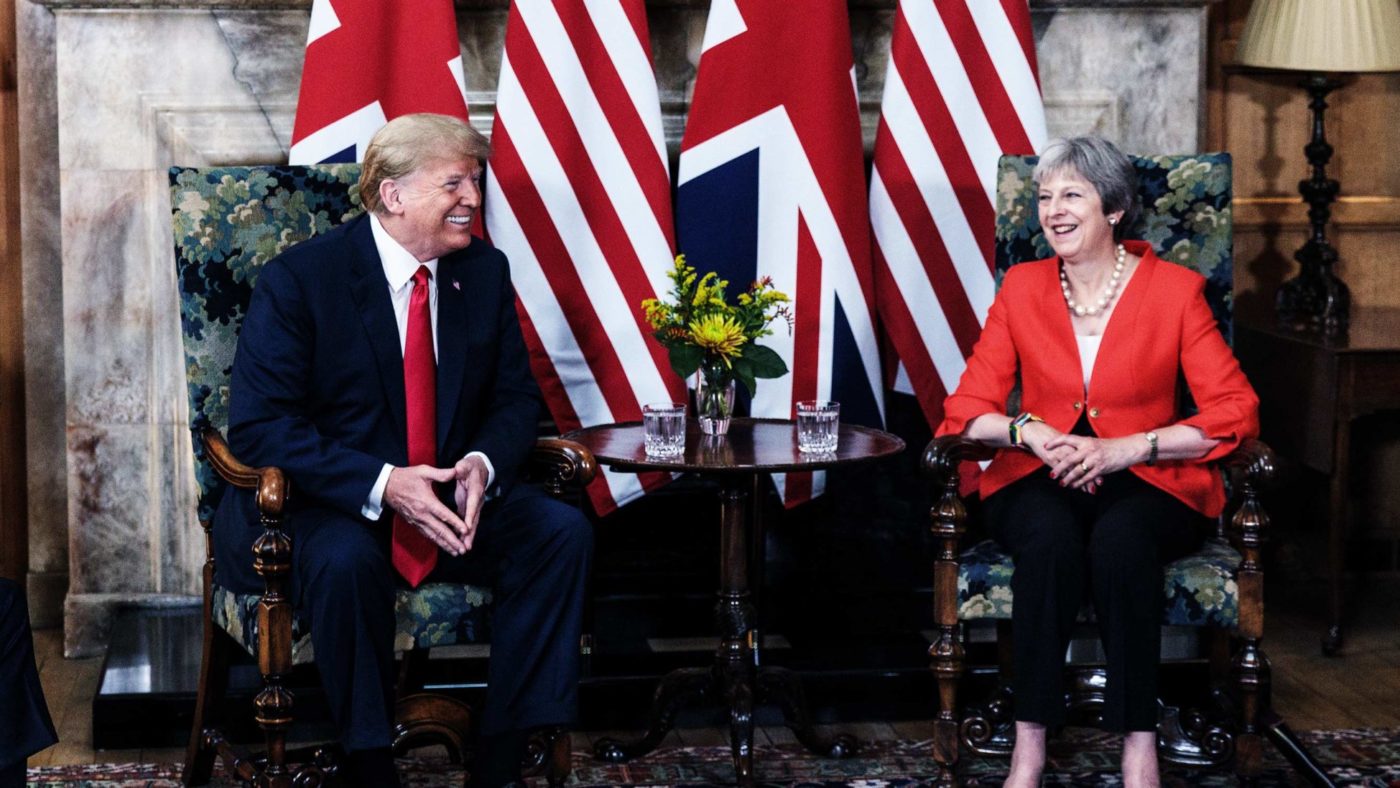To believe today’s headlines, Donald Trump has just ruled out a US-UK trade deal.
Trump told the Sun that the Chequers plan, with it’s “common rulebook” on goods “would probably end a major trade relationship with the US” — remarks that capped off what has been one of the most tumultuous weeks in Theresa May’s time as Prime Minister.
In a bizarre press conference this afternoon, Trump then claimed the recorded interview was “fake news” and told May “whatever you do is OK with us, just make sure we can trade together, that’s all that matters”.
Leaving aside the fact tat the US is already our largest export market, Trump’s comments are certainly a blow for those with high hopes for a rootin’, tootin’ transatlantic trade deal.
But to claim that Donald Trump’s comments this morning — or even the Chequers deal itself — are what has scuppered a US-UK trade deal ignores the many other obstacles that already existed.
First, there’s Michael Gove’s repeated commitment to maintaining the same animal welfare and environmental standards. “Unless there is a change in the American side we would say that those animal welfare rules are things on which we will not compromise,” the Environment Secretary declared towards the end of last year.
That in itself doesn’t rule a deal out – after all, we could simply have an arrangement which leaves out agriculture. But to do so would inevitably send a signal to any other industries who wanted to protect themselves from more competition that a bit of fierce lobbying can twist the Government’s arm.
Then there is Trump’s own attitude to trade. With his words and actions, the US president has made clear that he is a protectionist. Our government may accommodate Trump as best it can, but ministers must be quietly hoping he is succeeded by someone with a basic understanding of trade economics.
But even supposing we end up dealing with a different president in a few years’ time, there is still the issue of a lack of political will in the UK to really drive through a deal with the world’s largest economy.
We need only look at the absurd outcry over chlorinated chicken to get a sense of the public and special-interest backlash that would greet any attempt to open up our market to US firms.
To listen to the critics – and there are many – a deal with America means we will suddenly be deluged with toxic mulch from across the pond, imperilling the lives of poor British consumers. After falling ill from chlorinated chicken, they will have to get their credit cards out for private treatment because the dastardly Yanks will have taken over the NHS. Or something like that.
Gone is the notion that British shoppers might be able to exercise choice about what they want to buy. And while no one is suggesting we abandon sensible food safety standards, the evidence produced to support claims that US chicken is actually unsafe has been flimsy at best.
That whole sorry saga really had not much to do with food safety and a lot to do with a crude and depressingly widespread anti-Americanism. We saw a similar flavour of overblown, inaccurate claims made about TTIP — chiefly that it would involve privatising the NHS or allowing nasty US corporations to sue our government for lost profits, neither of which was actually part of the proposals.
Either way, prospects for a deal look dim. After all, if we can’t even rely on the avowedly pro-American Michael Gove to robustly make the case for a trade deal, just imagine what things would be like under a Labour government that sees the US as entirely beyond the pale.
In any case, is a trade deal necessarily the be-all-and-end all? As we have argued before on CapX, there’s a compelling case for the UK to embrace unilateral free trade, i.e. removing tariffs on goods entering the UK. As some Brexiteers have pointed out, this is the clearest benefit of coming out of the EU, removing ourselves from the protectionism of the customs union and letting British consumers buy what they want, unfettered by the cost of tariffs.
A recent House of Lords report inadvertently made this point extremely clearly, pointing out that a free trading relationship with the US would “undercut UK produced prices by some considerable margin” – bad news for farming special interests, perhaps, but undoubtedly a boon for British shoppers.
Even if we were to fall back on World Trade Organisation rules, that does not mean we are somehow compelled to impose tariffs — the WTO rules simply stipulate the maximum countries can levy if they so wish. This isn’t some pointy-headed theoretical point either — the Australian government has already demonstrated that a developed economy can embrace unilateral free trade with great success. One study estimates that trade liberalisation has resulted in a boost to average family incomes Down Under of some £4750 a year.
Sadly, though, here in the UK there appears to be a distinct lack of senior politicians of any stripe willing to make the bold but clear case for genuine free trade.


